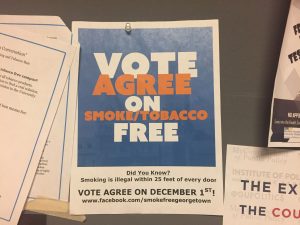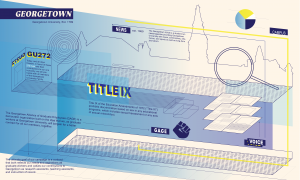The GUSA Senate voted unanimously to approve the Student Activities Budget Fiscal Year 2017 on Sunday April 7. The total budget, as allocated by GUSA’s Finance Appropriations Committee (Fin/App), came in at a total of $998,202.
The Fin/App budget provides funding to various Advisory Boards, as well as other groups and centers on campus. The money for the budget comes directly from the mandatory Student Activities Fee students must pay each fall. In the funding process, clubs submit budget requests to their respective Advisory Boards, such as Student Activities Commission (SAC) or Media Board, which then send in a total budget request to Fin/App. Once the Boards are allocated money by Fin/App and GUSA approves the budget, the Boards may divide it up amongst their clubs based on their requests.
In FY 2017, which covers the 2016-17 academic school year, Fin/App “received $1,607,311 in requests for funding,” according to a letter from Chair Betsy Johnson (COL ’16) to “GUSA Budget Summit Applicants and the Georgetown University Community.” The amount of money anticipated to be collected from the Student Activities Fee is $998,202; therefore, no groups received 100 percent of their request, Johnson said at the April 7 GUSA Senate meeting.
The largest allocation for FY2017 went to SAC, which received $235,000, to be provided to “the largest collection of student groups on campus,” according to GUSA’s SAC Liaison Owen Hayes (COL ’18) in the letter. In addition to being less than requested by SAC, this is a decrease from FY2016. “The Committee recommends that SAC continue to exercise strict scrutiny in their own funding process in order to ensure that the student tuition dollars are being used effectively,” Hayes wrote. “It would also be encouraged that SAC utilize their reserves if necessary to fill in the gaps.”
The Center for Social Justice Advisory Board for Student Organizations (CSJ-ABSO) received $170,000, a decrease of $12,000 from FY16. According to Gracie Shepherd, GUSA’s CSJ-ABSO Liaison, the allocation “largely reflects the Finance & Appropriations Committee’s concern about the use of the Student Activities Fee to fund international travel scholarships.” The committee “strongly encourages ABSO to either cut or reduce international travel scholarships or find alternate sources of funding,” she wrote in the letter.
Caitlin Snell (COL ’16), Co-Vice Chair of CSJ-ABSO, said that the decreased funding led to challenging decisions for the board. “It was frustrating having to sit in deliberations and decide whether or not students would have equal access to engage in social justice work at the same level of opportunity that they can engage in other activities on campus,” she said in an interview with the Voice.
In an effort to keep international travel opportunities, including ABP and Medical Brigades trips, accessible to all students through scholarships, the board chose to instead decrease their allotments to a wide variety of CSJ groups, in order to spread the $12,000 deficit across the organization as a whole.
Groups including GlobeMed, Alternative Breaks Program, Habitat for Humanity and Georgetown University Math and Science Hands-On Education (GUMSHOE) were among the student organizations receiving notably less funding than requested from ABSO, Snell said. For GlobeMed, the board was not “able to fund scholarships or subsidize their programming as much as we had hoped because of this decrease in funding allocation from GUSA,” she said.
“GUMSHOE had a decrease in funding which is frustrating because they also have expanded and become a very vibrant group both on campus and with their community partners,” she added, “but because of few resources, we’re struggling to be able to fully fund all of their science and math projects with their mentees.”
Georgetown Program Board (GPB) also saw a substantial cut, receiving $94,000, a decrease of 11.3% from FY2016. While the committee praised the group’s work in aiming to draw more popular performers in the letter and to increase co-sponsorship of events on campus, GPB Liaison Owen Coffin also wrote that “Part of the decision to decrease this year’s allocation was due to partial dissatisfaction with GPB’s apparent allocation of resources in years past.”
“It is still the case though that the committee recommends GPB consider which events have the highest student attendance and thus impact and redirect resources as the executive committee sees fit,” Coffin wrote.
Media Board saw a substantial increase of $40,000 more than the previous year; Johnson explained that the total of $95,000 was reflective of “what they should have been receiving,” based on decreased revenue generated by print journalism and increased costs. “The Committee’s rationale for this large increase came in part because of Media Board’s improved budgeting efforts and our recognition of the importance of print media on Georgetown’s campus,” according to Media Board Liaison Carter Rise (COL ‘17).
At the meeting, Senator Eric Henshall (COL ’16) applauded Fin/App’s decision in regards to campus media, which includes organizations such as The Hoya, the Voice, WGTB, and other media-related groups. “It’s clear to me that last year Media Board was criminally underfunded, so I’m glad to see that being rectified,” Henshall said. “It’s what they need to survive,” Rise added at the meeting.
Additionally, the Performing Arts Advisory Council (PAAC) and the Lecture Fund both saw increased funding for FY2017, though not to the full amount requested. Fin/App additionally allotted $15,000 to GUSA – $15,000 of which will go to the GUSA Fund, and the other $8,000 to be assigned to line items in the days immediately following the decision, according to Johnson and GUSA President Enushe Khan (MSB ’17).






